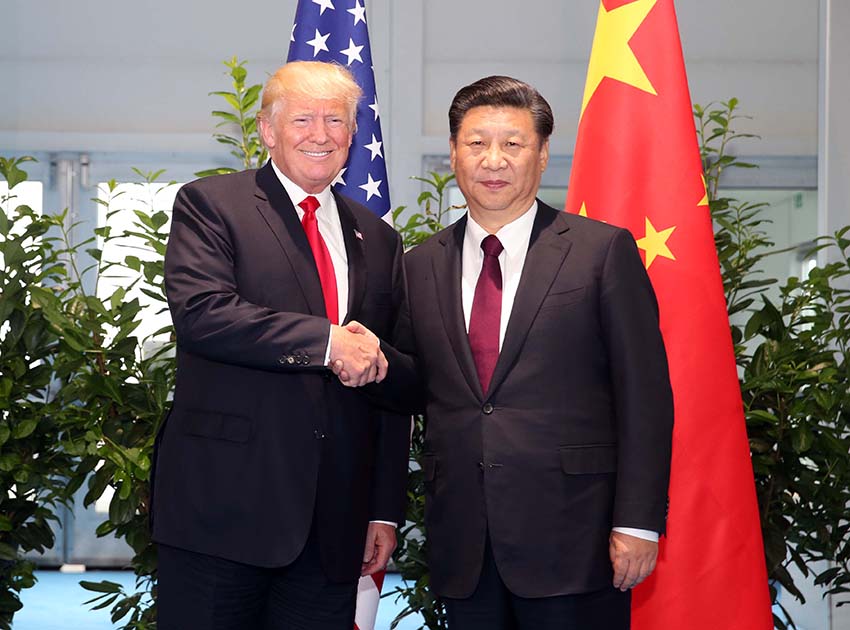


U.S. President Donald Trump announced Thursday that he will pay a state visit to China in November. The summit between Chinese President Xi Jinping and his U.S. counterpart Donald Trump will be one of the most anticipated events after the 19th CPC National Congress. Trump will come to China at a very historic moment, and it will be a great opportunity for the Sino-U.S. relationship.
Head-of-state diplomacy plays a leading role in developing the Sino-U.S. relationship. History tells us that the meetings between leaders of the two countries at critical moments had profound influences on the trajectory of the bilateral relationship. The warmth and chemistry between the two leaders helped to build and maintain a stable and friendly relationship between the two big powers.
This year marks the 45th anniversary of the normalization of the Sino-U.S. relationship. The success stories of the past 45 years repeatedly verified one rule, that is, the Sino-U.S. relationship is not a zero-sum game, and cooperation leads to real benefits for both countries and their people.
The Sino-U.S. relationship has always been and will always be marked by competition and cooperation. If the two parties settle on cooperation, they could achieve a win-win outcome; but if they opt for confrontation, there will be no positive outcomes, or may even result in disastrous consequences.
Given that there is an increasing economic interdependence between China and the United States, it is appropriate to say that there can only be win-win or lose-lose results for the two powers.
A stronger relationship with China will help build a stronger America. The healthy and stable bilateral ties are needed for the United States to pursue Trump's "Make America Great Again" policy.
Thus, it is certainly wiser for the two countries to remain partners as opposed to being rivals. The United States and China should respect each other's core interests, expand mutually beneficial cooperation on various areas, and manage their differences in a constructive fashion.
Trump is a wise businessman. He handled the relationship with China in a rational manner. When Trump was elected as U.S. president, many feared that he might take a harsh and more confrontational stance toward China by imposing massive tariffs on Chinese goods, labeling China a currency manipulator and deviating from the one-China policy. But the fact is, none of these scenarios materialized.
The room for Sino-U.S. cooperation is huge, from trade and investment to law enforcement and cyber security, from science and technology to culture and education. China and the United States enjoy complementary advantages in many fields, and the Sino-U.S. economic relationship is mutually beneficial. Strengthening cooperation and maintaining the good momentum of the Sino-U.S. ties is in the fundamental interests of both countries.
Cooperation is the only correct choice for China and the United States, and a better future would only be achieved through win-win cooperation.
The relationship between China and the United States is undoubtedly the most important bilateral relationship in the world. It concerns not only the interests of both nations, but also world peace, stability and prosperity.
Beijing has expressed its willingness to work jointly with Washington to focus on cooperation, seek mutual benefit and reciprocity, and manage and control differences. When working together, China and the United States can accomplish many great things of benefit to the entire world.
Trump's first China visit will be of great significance to the Sino-U.S. relationship, and will set the course for future cooperation between Beijing and Washington.
We expect Trump's Beijing trip to be a step forward for the Sino-U.S. ties. It is hopeful that the trip could attain positive outcomes, achieving tangible results on the economic and trade front and reaching more consensus on the Korean Peninsula nuclear issue.
As long as Washington works hand in hand with Beijing, we have enough reason to believe that there will be a brighter future for both China and the United States.
(Li Zhenyu, a distinguished bilingual author and scholar, is a contributing columnist with China Daily.)

 Award-winning photos show poverty reduction achievements in NE China's Jilin province
Award-winning photos show poverty reduction achievements in NE China's Jilin province People dance to greet advent of New Year in Ameiqituo Town, Guizhou
People dance to greet advent of New Year in Ameiqituo Town, Guizhou Fire brigade in Shanghai holds group wedding
Fire brigade in Shanghai holds group wedding Tourists enjoy ice sculptures in Datan Town, north China
Tourists enjoy ice sculptures in Datan Town, north China Sunset scenery of Dayan Pagoda in Xi'an
Sunset scenery of Dayan Pagoda in Xi'an Tourists have fun at scenic spot in Nanlong Town, NW China
Tourists have fun at scenic spot in Nanlong Town, NW China Harbin attracts tourists by making best use of ice in winter
Harbin attracts tourists by making best use of ice in winter In pics: FIS Alpine Ski Women's World Cup Slalom
In pics: FIS Alpine Ski Women's World Cup Slalom Black-necked cranes rest at reservoir in Lhunzhub County, Lhasa
Black-necked cranes rest at reservoir in Lhunzhub County, Lhasa China's FAST telescope will be available to foreign scientists in April
China's FAST telescope will be available to foreign scientists in April